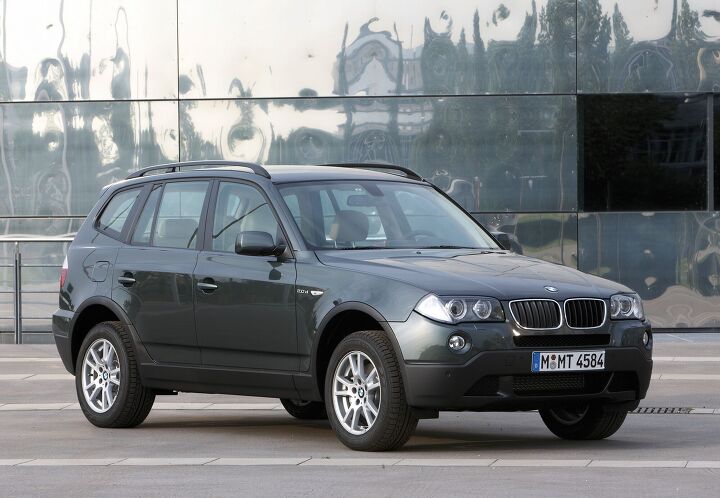BMW Accused of Emissions Cheating, Does Anyone Really Care?

Regulators in Germany have opened an investigation into alleged diesel exhaust rule circumvention on the part of BMW. Claims have been made that the automaker used an illegal defeat device on select models to achieve lower tailpipe emissions during testing. It’s a situation reminiscent of the Volkswagen Dieselgate scandal from 2015. However, government regulators have been on the offensive ever since — roping in loads of manufacturers and leaving a subset of the public wondering whether modern emission laws are even tenable.
The Kraftfahrt-Bundesamt (KBA), Germany’s federal transport authority, has alleged that BMW X3 models equipped with the brand’s 2.0-liter diesel motor contain software designed to skirt emission regulations. According to German outlet Bild, the issue stems from a difference in emissions based upon the status of the HVAC system.
Regulators are concerned that software may have been designed to intentionally emit less nitrogen oxides when the air-conditioning system is switched off. This reportedly matters because federal testing usually remains deactivated, leading to suspicion that BMW used this as a window to skirt regulations. But that seems like an oversimplification of the situation.
Due to the improved aerodynamics associated with driving with the windows up, combustion vehicles typically see improved fuel economy at highway speeds while running the air conditioner. This should also translate to lower emissions over time. However, the inverse is true at low speeds or idle because of the extra strain added by the compressor. It’s not unusual to see reduced carbon dioxide emissions when a vehicle isn’t running the A/C.
The investigation follows an earlier report issued by German environmental group Deutsche Umwelt Hilfe (DUH), which stated the BMW X3 2.0d possessed an illegal defeat device that allowed vehicles to pollute more under certain conditions. Accusations were thrown that BMW’s diesel motor saw a larger drop in emissions when the vehicle’s A/C was switched off than usual, suggesting that it could be the result of software malfeasance — comparing it to what happened with Volkswagen’s diesel vehicles years earlier.
“It is shocking that even more than seven years after the diesel scandal became known, we are detecting the highest nitrogen oxide emissions we have measured to date in diesel vehicles in real driving conditions and are finding shutdown devices in the engine control software,” DUH’s Federal Managing Director Jürgen Resch stated in German.
However, things aren’t that simple. Jürgen has been a professional environmental lobbyist since the 1980s and Deutsche Umwelt Hilfe has taken major criticisms for endorsing driving bans, carbon credits, and targeting stringent emissions laws at the expense of what’s reasonably achievable. Jürgen himself has likewise been faulted as one of the many high-profile climate activists that have utilized private jets. There’s also a lot of political tension due to how the DUH is organized — especially in regard to its ties to the government, despite claiming status as an NGO.
The organization receives funding from the American ClimateWorks Foundation, the European Commission and the German federal government as part of an EU-wide campaign to reduce pollution. It has similarly taken heat for campaigning for the advancement of diesel particulate filters in 2005 after accepting donations from the very same companies that manufacture them. It even went out of its way to endorse specific brands, calling into question how objective it truly was as an influential environmental watchdog.
DUH has likewise received funding from automakers and occasionally partnered with companies on certain programs. While several have cut ties in more recent years (e.g. Daimler and Toyota), the organization continues to receives criticism for claiming to be a non-profit.
Still, the above doesn’t automatically mean the group hasn’t uncovered emissions cheating on the part of BMW. Its investigation into Volkswagen Group helped uncover software manipulation that had the vehicle’s running lean spending on wheel positioning (indicating that it was operating on a test rig). So there’s reason to believe it might have uncovered similar shenanigans here.
But it also played a role in killing demand for affordable diesel vehicles in both Europe and the United States. No matter how you slice it, Deutsche Umwelt Hilfe seems hellbent on ending diesel-based transportation and it’s difficult to overstate just how much influence it has over German regulators and the industry at large.
While BMW won’t say much about the current investigation, it did end 2023 stating it’s in contact with European authorities to clarify questions made about emissions following concerns about a specific BMW model produced between 2010 and 2014. Odds are good it was talking about the X3 with the 2.0-liter diesel.
BMW CEO Harald Krueger also previously said that the company had not manipulated any diesel engines following the initial allegations — perhaps hinting at its stance should any formal charges be pressed.
But your author is wondering whether or not anyone even cares at this point. Volkswagen was fined billions of dollars and the United States forced it into establishing a subsidiary to improve the national EV charging infrastructure. The company is known as Electrify America and it has consistently been the worst-ranked charging network in the country. VW has also struggled to effectively launch EVs as it pivoted toward electrification, despite remaining broadly profitable.
For all the effort put into emissions regulations, they arguably haven’t resulted in better automobiles. Consumer satisfaction surveys have been trending downward while prices continue to climb. Meanwhile, regulatory efforts seem focused on determining what type of vehicle you’ll be allowed to drive in the future and using regulatory fines to further shape the industry by pouring the money back into businesses that are ideologically aligned with the relevant NGOs.
Similar arguments can certainly be made about the oil industry. But it also appears to have bought into using environmentalism as a shield. Its lobbying efforts are also a little more blatant and the entities shilling for it don’t appear to have the government’s ear like they used to. The real issue is likely not which group is trying to influence policy but rather the fact that it’s happening on a corporate and/or political level. At the end of the day, too much of this just feels like a colossal waste of time and money without any noteworthy advantages trickling down to the consumer.
[Image: BMW]
Become a TTAC insider. Get the latest news, features, TTAC takes, and everything else that gets to the truth about cars first by subscribing to our newsletter.

A staunch consumer advocate tracking industry trends and regulation. Before joining TTAC, Matt spent a decade working for marketing and research firms based in NYC. Clients included several of the world’s largest automakers, global tire brands, and aftermarket part suppliers. Dissatisfied with the corporate world and resentful of having to wear suits everyday, he pivoted to writing about cars. Since then, that man has become an ardent supporter of the right-to-repair movement, been interviewed on the auto industry by national radio broadcasts, driven more rental cars than anyone ever should, participated in amateur rallying events, and received the requisite minimum training as sanctioned by the SCCA. Handy with a wrench, Matt grew up surrounded by Detroit auto workers and managed to get a pizza delivery job before he was legally eligible. He later found himself driving box trucks through Manhattan, guaranteeing future sympathy for actual truckers. He continues to conduct research pertaining to the automotive sector as an independent contractor and has since moved back to his native Michigan, closer to where the cars are born. A contrarian, Matt claims to prefer understeer — stating that front and all-wheel drive vehicles cater best to his driving style.
More by Matt Posky
Latest Car Reviews
Read moreLatest Product Reviews
Read moreRecent Comments
- Bd2 Lexus is just a higher trim package Toyota. ^^
- Tassos ONLY consider CIvics or Corollas, in their segment. NO DAMNED Hyundais, Kias, Nissans or esp Mitsus. Not even a Pretend-BMW Mazda. They may look cute but they SUCK.I always recommend Corollas to friends of mine who are not auto enthusiasts, even tho I never owed one, and owned a Civic Hatch 5 speed 1992 for 25 years. MANY follow my advice and are VERY happy. ALmost all are women.friends who believe they are auto enthusiasts would not listen to me anyway, and would never buy a Toyota. They are damned fools, on both counts.
- Tassos since Oct 2016 I drive a 2007 E320 Bluetec and since April 2017 also a 2008 E320 Bluetec.Now I am in my summer palace deep in the Eurozone until end October and drive the 2008.Changing the considerable oils (10 quarts synthetic) twice cost me 80 and 70 euros. Same changes in the US on the 2007 cost me $219 at the dealers and $120 at Firestone.Changing the air filter cost 30 Euros, with labor, and there are two such filters (engine and cabin), and changing the fuel filter only 50 euros, while in the US they asked for... $400. You can safely bet I declined and told them what to do with their gold-plated filter. And when I changed it in Europe, I looked at the old one and it was clean as a whistle.A set of Continentals tires, installed etc, 300 EurosI can't remember anything else for the 2008. For the 2007, a brand new set of manual rec'd tires at Discount Tire with free rotations for life used up the $500 allowance the dealer gave me when I bought it (tires only had 5000 miles left on them then)So, as you can see, I spent less than even if I owned a Lexus instead, and probably less than all these poor devils here that brag about their alleged low cost Datsun-Mitsus and Hyundai-Kias.And that's THETRUTHABOUTCARS. My Cars,
- NJRide These are the Q1 Luxury division salesAudi 44,226Acura 30,373BMW 84,475Genesis 14,777Mercedes 66,000Lexus 78,471Infiniti 13,904Volvo 30,000*Tesla (maybe not luxury but relevant): 125,000?Lincoln 24,894Cadillac 35,451So Cadillac is now stuck as a second-tier player with names like Volvo. Even German 3rd wheel Audi is outselling them. Where to gain sales?Surprisingly a decline of Tesla could boost Cadillac EVs. Tesla sort of is now in the old Buick-Mercury upper middle of the market. If lets say the market stays the same, but another 15-20% leave Tesla I could see some going for a Caddy EV or hybrid, but is the division ready to meet them?In terms of the mainstream luxury brands, Lexus is probably a better benchmark than BMW. Lexus is basically doing a modern interpretation of what Cadillac/upscale Olds/Buick used to completely dominate. But Lexus' only downfall is the lack of emotion, something Cadillac at least used to be good at. The Escalade still has far more styling and brand ID than most of Lexus. So match Lexus' quality but out-do them on comfort and styling. Yes a lot of Lexus buyers may be Toyota or import loyal but there are a lot who are former GM buyers who would "come home" for a better product.In fact, that by and large is the Big 3's problem. In the 80s and 90s they would try to win back "import intenders" and this at least slowed the market share erosion. I feel like around 2000 they gave this up and resorted to a ton of gimmicks before the bankruptcies. So they have dropped from 66% to 37% of the market in a quarter century. Sure they have scaled down their presence and for the last 14 years preserved profit. But in the largest, most prosperous market in the world they are not leading. I mean who would think the Koreans could take almost 10% of the market? But they did because they built and structured products people wanted. (I also think the excess reliance on overseas assembly by the Big 3 hurts them vs more import brands building in US). But the domestics should really be at 60% of their home market and the fact that they are not speaks volumes. Cadillac should not be losing 2-1 to Lexus and BMW.
- Tassos Not my favorite Eldorados. Too much cowbell (fins), the gauges look poor for such an expensive car, the interior has too many shiny bits but does not scream "flagship luxury", and the white on red leather or whatever is rather loud for this car, while it might work in a Corvette. But do not despair, a couple more years and the exterior designs (at least) will sober up, the cowbells will be more discreet and the long, low and wide 60s designs are not far away. If only the interiors would be fit for the price point, and especially a few acres of real wood that also looked real.


































Comments
Join the conversation
I totally care. So there!
The new on-the-road tests mandated by the EU do result in noteworthy advantages in nitrogen emissions.
This is how automakers tied themselves up in a knot: they cheated in emissions before, which led to more stringent regulation by lawmakers after air quality in cities failed to improve, and now automakers have to actually hit those more stringent targets in real-world conditions.